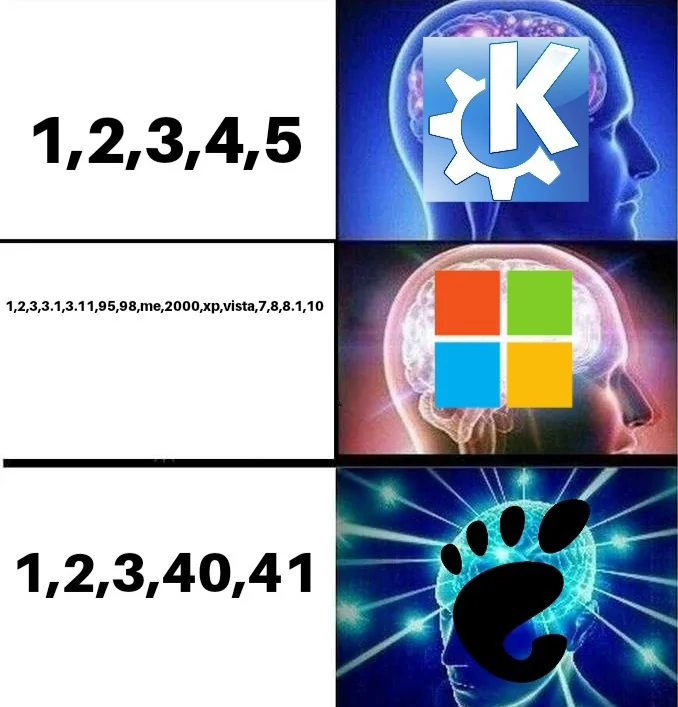Honestly, I just wish they would ditch that disgusting foot logo. I hate it.
linuxmemes
I use Arch btw
Sister communities:
- LemmyMemes: Memes
- LemmyShitpost: Anything and everything goes.
- RISA: Star Trek memes and shitposts
Community rules
- Follow the site-wide rules and code of conduct
- Be civil
- Post Linux-related content
- No recent reposts
Please report posts and comments that break these rules!
Bro thinks he is Nickelodeon 😭
As I tell my wife, feet are gross.
Your poor wife.
Of all the things wrong with GNOME, their choice of logo is at the bottom of the list.
Their insistence that it be pronounced 'guh-nome' is a worse crime.
GNU as the animal or the initials, okay, sure. Debatable. Gnome is a whole-ass word. That is ridiculous.
Up there with QT insisting their name isn't Q-T. The initials are a word. If you wanted it pronounced Qute you should've called it that.

ill be downloading this image thank you very much
Mac OS: Cat, Dog, Cow, Panther, Some California park, your uncles house
Everything should be date-based name releases.
If it’s released April, 2023 it should be 23.04 or similar.
Other schemes are arbitrary.
Change my mind.
How would you differentiate between versions with major api breaks?
Semantic versioning. If I have 1.0.0 and you release 1.1.0 I can be pretty confident it's safe to update. If you release 2.0.0 I need to read the release notes and see what broke.
If I have version July2023 and you release August2023 I have no information about if it's safe to update. That's terrible. That's really bad.
This is for dependency management and maybe apis more than OSs, but in general semantic versioning is a very good system. It should be used often.
They both serve different purposes
KDE Plasma does its versioning to follow QT versioning, which does its versioning in that way to signify API breaks.
But for something else like, say, the Linux kernel, which does not break compatibility in that manner, date-based would make more sense.
Marketing version (23.04 or just 23) and semver (3.11.3)
Change my mind
I'll likely call it 6.0 since I'm starting to worry about getting confused by big numbers again.
Poor Windows NT.
NT was a parallel line of "professional" windows. It had a different kernel or something. There were equivalent versions to most of the home releases.
The first release was NT 3.1, to match version numbers with the home OS.
NT 4 was the professional version of win 95/98.
In the year 2000 Microsoft released both Windows ME, and Windows 2000. ME for the home, 2000 was the NT release for the workplace.
The products were merged with windows XP, now all windows is windows NT.
The version numbering makes sense if you count by the NT version numbers. 2000/ME is version 5, therefore XP is 6, and if you pretend Vista never existed (as you should for your own sanity) you get to windows 7 and it all starts to make sense.
Because in the end a "version number" is just part of the name. You can call it anything you want.
Minecraft 1.7.🍌
Minebanan: now with more banan
That still doesn't explain why you would choose the other two instead of just counting 1, 2, 3, 4, 5 like a sane person.
Juking the version number was trendy there for a while. It happened to browser versions to. Firefox and Chrome went from like version 10 to 100.
By 2024 firefox will be on version 1043^624^x*12^69 where x is the latest version of chrome.
Even stranger is the windows 8 and 8.1 part since this is the one and only time a service pack changed the name of the OS.
See also the Doom numbering system: Ultimate, 2, 64, Final, 3, (2016), Eternal.
Windows 95, 98, me were kernel version 4.0+
Windows 2000 was kernel 5.0
XP and Vista were 6.0 and 6.1
Windows 10 had to be called that because the naming convention used on Windows 95/98 caused someware to see the OS as version 9.x
Also Firefox, please stop
